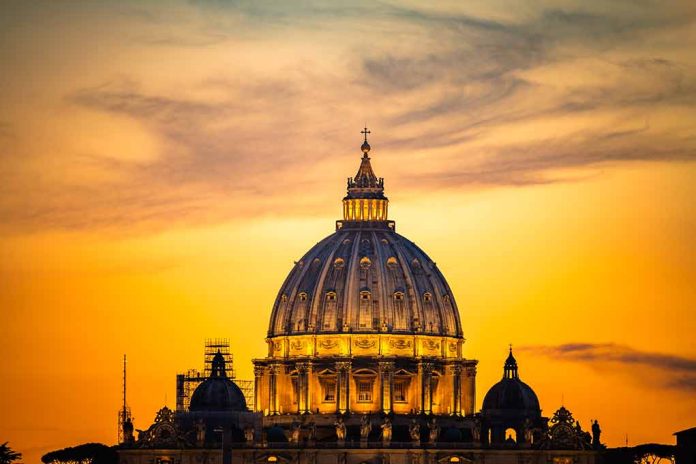
The secretive process of electing the next pope is not only captivating the world’s attention but also fueling a burgeoning betting market.
Key Takeaways
- Cardinals Pietro Parolin and Luis Antonio Tagle are leading candidates to become the next pope.
- A conclave with 133 cardinals will meet in the Sistine Chapel to choose a successor after Pope Francis’s death.
- Betting platforms like Polymarket and Kalshi have seen millions wagered on the papal election.
- The accuracy of betting markets in papal selections is debated due to the conclave’s secrecy.
- Harry Crane highlights that the papal betting market is relatively small compared to others.
Candidates and Betting Markets
Following Pope Francis’s passing, the process of selecting his successor begins with heightened expectations. Cardinals Pietro Parolin and Luis Antonio Tagle have emerged as frontrunners. In a conclave comprising 133 cardinals that takes place in the Vatican’s Sistine Chapel, the stakes are high, and millions have been wagered on platforms such as Polymarket and Kalshi.
Parolin, an Italian Vatican diplomat, is favored as a compromise candidate suitable for both progressive and conservative blocs. Tagle, known for social justice initiatives, could become the first Asian pontiff in modern times. Meanwhile, Ghana’s Cardinal Peter Turkson and Matteo Maria Zuppi from Italy are also under consideration, each bringing their unique perspectives to the highest seat of the Catholic Church.
Market Dynamics and Spiritual Stakes
The papal betting market, though small compared to, for example, the U.S. presidential elections, reflects significant interest from recreational bettors. Cardinal Parolin carries 15-8 odds, with Luis Antonio Tagle closely following at 5-2. These odds, however, primarily mirror media and public perceptions rather than exclusive insights.
“Current betting odds, favoring cardinals like Parolin and Tagle, probably reflect general perceptions, media attention and public profile rather than special insider knowledge or highly accurate predictive insight,” said Leighton Vaughan Williams, an economics professor at the UK’s Nottingham Business School.
Besides betting on who the new pope will be, wagers also extend to details such as the selected papal name, nationality, and the voting process’s rounds. However, caution is advised as the conclave’s clandestine nature makes any prediction prone to uncertainty.
Secrecy and Tradition
The conclave’s enigmatic proceedings only heighten anticipation. Voting is scheduled to begin at 4:30 p.m. local time in Rome. The symbolic smoke signals—black for no consensus and white for a successful election—are eagerly awaited worldwide. The age-old traditions underscore the solemn atmosphere of the papal transition.
Ultimately, while betting markets add an engaging element to the papal elections, the selection remains an inherently spiritual decision. Cardinals are entrusted with choosing not just a leader, but a figure who embodies faith for Catholics around the world.





